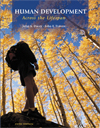 |  Human Development Across the Lifespan, 5/e John S. Dacey,
Boston College
John F. Travers,
Boston College
Middle Childhood Psychosocial Development in Middle Childhood
Outline- The changing sense of self
- Self-esteem
- Perceived self
- Ideal self
- Self-esteem and competence
- Harter's five types of competence
- Honesty, support, and encouragement from others
- Children and self-control
- Self-control defined
- The roots of violent behavior
- Developmental pathways of chronic offenders
- Hyperactivity and oppositional behavior during preschool
- Frequent aggressive behavior during school years
- Varied forms of delinquency, which appear in adolescence
- Clues to troublesome behavior
- Children and impulse control
- Impulsivity and development
- Transformations
- The influence of peers
- Interactions, relationships, and groups: the middle childhood years
- Levels of social complexity
- Individual
- Interactions
- Relationships
- Groups
- Children's friendships
- Social perspective-taking
- Peers in middle childhood
- Schools and middle childhood
- The importance of schools
- School effectiveness impacts development
- Criteria for positive school environment
- Good instructional leadership
- Orderly environment
- Support of parents and administrators
- Schools and development
- Schools, development, and learning
- Characteristics of learning
- Conclusion of Eccles and Rosser's research
- Television and development
- Television and cognitive development
- Children remember what is said
- The amount of time spent looking at the set is directly related to age
- Specific features of programs attract children
- Children quickly learn to relate sound to sight
- Television viewing and school achievement are related
- Television and violence
- Televised violence is a cause of aggressive behavior in children who observe it
- Prosocial television programming can foster development
- Stress in childhood
- Types of stress
- Individual differences in reactions to stress
- Sex
- Age
- Temperament
- Abused children
- Four major types of abuse
- The nature of the problem
- Parental characteristics leading to child abuse
- The special case of sexual abuse
- Sexual abuse defined
- Effects of sexual abuse
- Resilient children
- Identifying resilient children
- Characteristics of resilient children
- Temperament that elicits positive responses
- Special interest or talent
- Good problem-solving skills
- Presence of a supportive adult
- Bond with one parent
|
|



 2002 McGraw-Hill Higher Education
2002 McGraw-Hill Higher Education